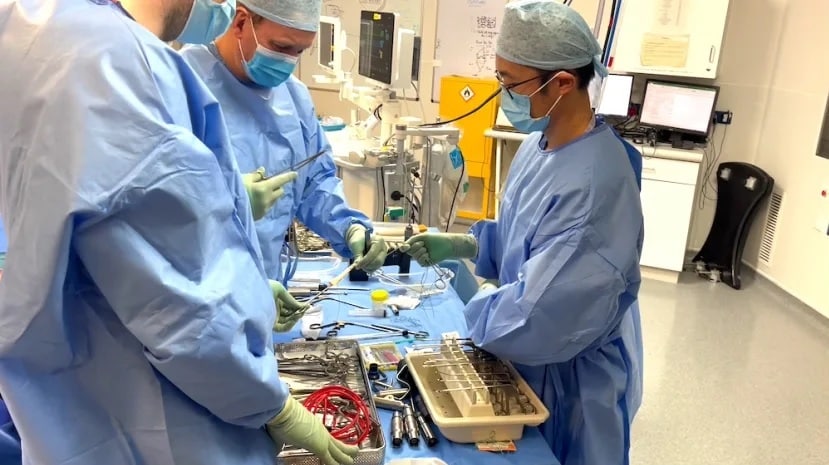A LIFE-changing knee surgery that aims to help young patients get back on their feet is being trialled at
Tunbridge Wells Hospital.
Matthew Milbank, an aspiring player in the academy at Gillingham FC, tore his anterior cruciate ligament (ACL) playing football in 2022, and was offered the opportunity to take part in the trial.
Damage to the anterior cruciate ligament, where severe twisting force is applied to the knee, can be a life-altering injury. It is most common among those who play sports such as football, netball, or skiing.
Usually, surgeons would operate by taking part of the patient’s own hamstring tendon to create a new ACL, which connects the two bones up to the knee.
However, with the advancements in medicine, the new surgery being trialled at Maidstone and Tunbridge Wells NHS Trust (MTW) will see the donor hamstring tendon taken from a parent.
His father, Andy Milbank, who donated his tendon to his son as part of the new procedure said: “It’s one less complication for the child to recover from. He’s got major knee surgery but hasn’t [also] got to worry about his hamstring.”
Matthew’s mother, Clare Milbank added “The support and care both Matt and Andy have received from all the team involved at Tunbridge Wells Hospital, along with Gillingham Football Club, has been incredible and we can’t thank them enough.”
The pioneering technique was developed in Australia, and it is hoped that it will become routine surgery across the UK.
Nick Bowman, the leading Consultant Orthopaedic Surgeon, said: “There are a number of advantages to this new technique. First, the child’s own hamstring tendons are not disrupted, which improves their recovery.
“Second, the tendon taken from the parent will be larger, making it more suitable as the child grows, which we hope will reduce the re-injury rate.
“And finally, if the child is injured later in life, they still have their own hamstring, which could then be used to repair a tear.”
Helen Samuel, the Specialist Orthopaedic Research Physiotherapist who supports the patients during their recovery, said: “To finally open a study that looks like it will be really beneficial to our patients – and might change the pathway for these patients throughout the NHS – has been a great experience.”








